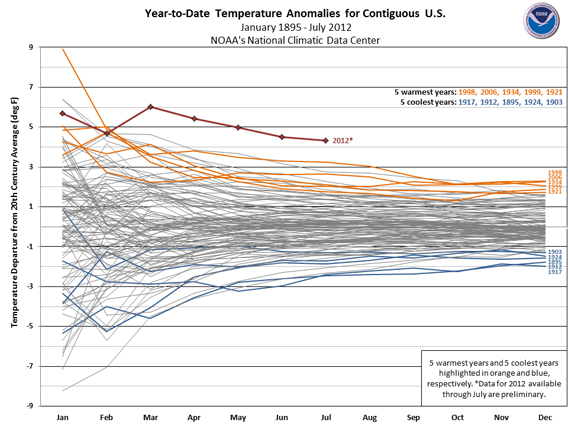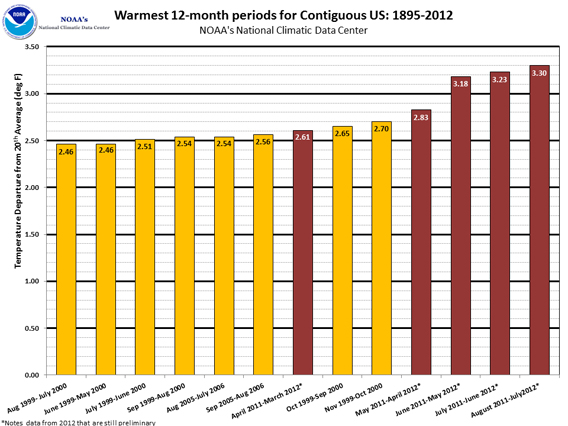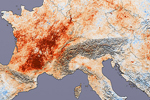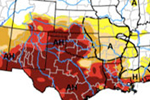
Year-to-date temperature, by month, for 2012 (red), compared to the other 117 years on record for the contiguous U.S., with the five ultimately warmest years (orange) and five ultimately coolest years (blue) noted. Graph courtesy of the NOAA. Click to enlarge.
Last month was not only the hottest July in U.S. weather history, but the hottest month ever recorded in the contiguous U.S, besting a record struck in July 1936 during the Dust Bowl, according to new data from the National Oceanic and Atmospheric Administration (NOAA). The average temperature last month over the contiguous U.S. was 77.6 degrees Fahrenheit, or 3.3 degrees Fahrenheit above the 20th Century average. Making matters worse, crippling drought continued to spread over 63 percent of the lower 48 states.
Last month also marked the fourth time in a row where the past 12 months have been the hottest in the U.S. The streak, which began in April 2012, has been bested every month since with August 2011-July 2012 now the new record holder.
July 2012 was also notable for wildfires in the U.S. In total, 9,869 wildfires were documented, the 5th most ever, which burned just over 2 million acres, the 4th most ever.
Temperatures in the U.S., which makes up only 2 percent of the world’s landmass, should not be seen as a proxy for global climate change. Instead, it should be noted that climate change is having an impact regionally.
“By itself this is not such a major feat, but the fact that the first seven months of the year is the hottest on record is much more impressive from a climate standpoint, and highlights the fact that there is more than just natural variability playing a role: global warming from human activities has reared its head in a way that can only be a major warning for the future,” Kevin Trenberth, a climatologist at the National Center for Atmospheric Research in Boulder, Colorado, told Live Science. “No, it won’t be like this next year, but these conditions will likely occur somewhere else. And the odds of them occurring in the U.S. have increased.”
In fact, a recent landmark study by NASA scientists found that heatwaves over the past thirty years could be statistically attributed to global climate change. The same study found that extreme heatwaves had increased 50 to 100 times over the past three decades from a baseline of 1951-1980.
“We can say with high confidence that such extreme anomalies would not have occurred in the absence of global warming,” the researchers wrote.
Globally, temperatures have risen around 0.8 degrees Celsius (1.44 degrees Fahrenheit) since the late Nineteenth Century. However this hasn’t happened uniformly, some regions, like the Arctic, have warmed to a much greater degree than others. Worldwide, the past decade (2000-2009) was the warmest on record, while 2010 and 2005 are generally considered tied for the warmest year. In fact, the Earth hasn’t experienced a single year below the 20th Century average since 1975.
U.S. temperature records date back to 1895.

The ten warmest 12-month periods of the U.S. record. Not all of them have occurred since 2000. Graph courtesy of the NOAA. Click to enlarge.
Related articles
Extreme heatwaves 50 to 100 times more likely due to climate change

(08/05/2012) A recent rise in deadly, debilitating, and expensive heatwaves was caused by climate change, argues a new statistical analysis published in the Proceedings of the National Academy of Sciences (PNAS). Climatologists found that extreme heatwaves have increased by at least 50 times during the last 30 years. The researchers, including James Hansen of NASA, conclude that climate change is the only explanation for such a statistical jump.
Prominent climate skeptic reverses course, says global warming worse than IPCC forecast
(07/30/2012) After starting his own project to study global warming, a once-prominent climate change skeptic and physicist says he now accepts the reality of anthropogenic climate change. “Last year, following an intensive research effort involving a dozen scientists, I concluded that global warming was real and that the prior estimates of the rate of warming were correct. I’m now going a step further: Humans are almost entirely the cause,” Richard Muller writes in the New York Times as his team, the Berkeley Earth Project, releases a new paper that finds an even stronger link between greenhouse gas emissions and rising temperatures worldwide than the Intergovernmental Panel on Climate Change (IPCC).
Featured video: climate change bringing on the extremes
(07/24/2012) Focusing on extreme weather events in the U.S. this summer, a new compilation video highlights the connection between climate change and increasing and worsening extremes, such as heatwaves, droughts, and floods.
Drought, heat, fires push more Americans to accept reality of climate change
(07/19/2012) Record temperatures, wildfires, drought, and crop failures have is helping convince more Americans that climate change is real and occurring, reports Bloomberg.
Borneo’s forests face dire future from global warming
(07/18/2012) Already wracked by extensive deforestation and forest degradation, the future looks grim for Borneo’s tropical rainforests, reports a new study published in the Journal of Geophysical Research-Biogeosciences.
Northern Hemisphere experiences warmest June on record
(07/17/2012) The Northern Hemisphere suffered its warmest June on record across land and sea, while globally it was the fourth warmest June yet, according to new data from the National Oceanic and Atmospheric Administration (NOAA).
Deja vu: U.S. undergoes hottest 12 months on record…again and again
(07/12/2012) According to new data from the National Oceanic and Atmospheric Administration (NOAA)’s National Climatic Data Center, the last twelve months have been the warmest on record for the contiguous United States. This record, set between July 2011 through June 2012, beat the last consecutive twelve month record set only a month earlier between June 2011 and May 2012, which in turn beat the previous record holder, you guessed it: May 2011 through April 2012.
Climate change increased the probability of Texas drought, African famine, and other extreme weather

(07/11/2012) Climate change is here and its increasing the chances for crazy weather, according to scientists. A prestigious group of climatologists have released a landmark report that makes the dramatic point that climate change is impacting our weather systems—and in turn our food crops, our economies, and even our lives—here-and-now. The new report in the American Meteorological Society is first of what is intended to be an annual offering that will attempt to tease out the connections between climate change and individual extreme weather events, such as heatwaves, droughts and floods.







